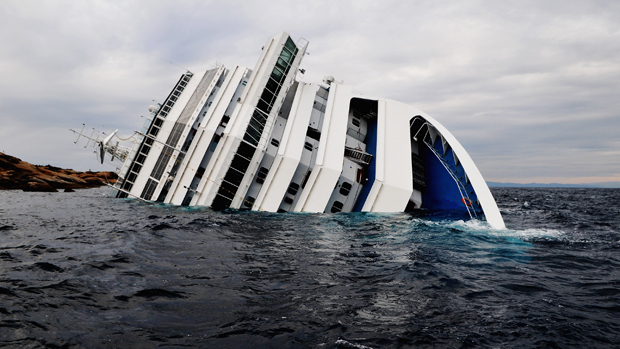Costa Concordia: operation to re-float liner begins
Largest maritime salvage operation begins, but activists fear re-floating Costa Concordia could harm dolphins

A free daily email with the biggest news stories of the day – and the best features from TheWeek.com
You are now subscribed
Your newsletter sign-up was successful
The final phase of the operation to salvage the wreck of the Costa Concordia is getting underway today, nearly two and half years after the tragedy occurred on the Italian island of Giglio.
The refloating and towing of the cruise-liner is set to be "the biggest maritime salvage operation in history", reports the Telegraph.
The ship crashed into rocks and capsized, killing 32 people in January 2012. It is hoped that the body of Russell Rebello, the last victim of the disaster not yet accounted for, will finally be discovered.
The Week
Escape your echo chamber. Get the facts behind the news, plus analysis from multiple perspectives.

Sign up for The Week's Free Newsletters
From our morning news briefing to a weekly Good News Newsletter, get the best of The Week delivered directly to your inbox.
From our morning news briefing to a weekly Good News Newsletter, get the best of The Week delivered directly to your inbox.
What has already been done?
Last September, the vessel was partially righted and left resting on six steel platforms.
How are they planning to re-float it?
Engineers will pump air into 30 tanks in the hull of the ship, forcing out seawater and – if all goes according to plan – raising the ship by 12 metres, the Telegraph reports.
A free daily email with the biggest news stories of the day – and the best features from TheWeek.com
Franco Gabrielli, the head of the civil protection agency overseeing the salvage, told the BBC that it would be "a very complex operation".
"The first phase of the operation will be the most dangerous because the vessel will be detached from the platforms," he said.
What happens next?
Once the vessel has been raised, several tug boats will then tow the wreckage 200 nautical miles to the port of Genoa, where it will be scrapped.
How long will it take?
If the weather is good, engineers predict the re-floating operation will take less than a week, and a further five days to tow the wreckage away. The entire scrapping process is estimated to take up to two years.
How much will it all cost?
The entire operation including raising, re-floating, towing and scrapping of the ship is expected to cost over €1.5 billion, according to the chief executive of Costa Cruises.
Reaction to the re-floating
Residents of the popular tourist island say they are relieved that the wreckage is finally being cleared. "I am happy they are taking it away because to see a ship like that always there, with the deaths that happened, it gives us the shivers," Italo Arienti told Reuters.
But environmentalists warn of a serious risk of pollution as the route to Genoa passes through a whale and dolphin reserve. They say that it should be taken to a closer port.
"We're worried about the duration of the journey, and the fact that it will pass through the marine sanctuary," said Cecilia Martinez from Greenpeace Italy. Activists are expected to the follow the vessel in small boat to monitor the situation, but said they would not take direct action.
-
 What to know before filing your own taxes for the first time
What to know before filing your own taxes for the first timethe explainer Tackle this financial milestone with confidence
-
 The biggest box office flops of the 21st century
The biggest box office flops of the 21st centuryin depth Unnecessary remakes and turgid, expensive CGI-fests highlight this list of these most notorious box-office losers
-
 What are the best investments for beginners?
What are the best investments for beginners?The Explainer Stocks and ETFs and bonds, oh my
-
 Epstein files topple law CEO, roil UK government
Epstein files topple law CEO, roil UK governmentSpeed Read Peter Mandelson, Britain’s former ambassador to the US, is caught up in the scandal
-
 Iran and US prepare to meet after skirmishes
Iran and US prepare to meet after skirmishesSpeed Read The incident comes amid heightened tensions in the Middle East
-
 Israel retrieves final hostage’s body from Gaza
Israel retrieves final hostage’s body from GazaSpeed Read The 24-year-old police officer was killed during the initial Hamas attack
-
 China’s Xi targets top general in growing purge
China’s Xi targets top general in growing purgeSpeed Read Zhang Youxia is being investigated over ‘grave violations’ of the law
-
 Panama and Canada are negotiating over a crucial copper mine
Panama and Canada are negotiating over a crucial copper mineIn the Spotlight Panama is set to make a final decision on the mine this summer
-
 Why Greenland’s natural resources are nearly impossible to mine
Why Greenland’s natural resources are nearly impossible to mineThe Explainer The country’s natural landscape makes the task extremely difficult
-
 Iran cuts internet as protests escalate
Iran cuts internet as protests escalateSpeed Reada Government buildings across the country have been set on fire
-
 US nabs ‘shadow’ tanker claimed by Russia
US nabs ‘shadow’ tanker claimed by RussiaSpeed Read The ship was one of two vessels seized by the US military